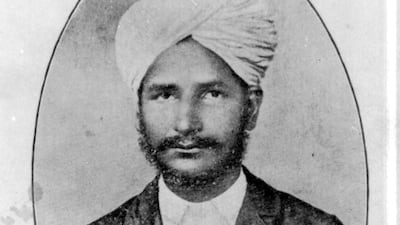It was late in the afternoon when British Army troops entered the Jallianwala Bagh, a walled public garden in Amritsar.
Thousands of people had peacefully assembled there on April 13 to protest against the arrest of local leaders but also to celebrate an important Sikh festival.
But there was no mercy in India that day in 1919. Fearing a major insurrection, Brig Gen Reginald Dyer ordered his soldiers to fire.
They strafed the crowd until their ammunition was spent and within a few minutes between 500 and 600 people lay dead, with possibly three times as many wounded. Exact figures will never be known.
Caught in the stampede during the horrific bloodbath was a 22-year-old writer, Nanak Singh, who had gone to the Bagh with his two friends.
While they were both killed, he fainted and was covered by falling corpses. Singh then wrote a searing poem about the massacre which was published in 1920 and promptly banned by the British for sedition. But the flame of Indian independence had been lit.
“He was so traumatised by the event that he would rarely speak about it,” said Navdeep Suri, 60, Singh’s grandson and India’s current ambassador to the UAE.
“It is like he wanted to bury this and leave it behind,” said Mr Suri, who grew up in Amritsar just a stone’s throw from the site.
“And it was only through our grandmother that we would hear that not only was he present but that he fainted and was piled up among the corpses. It was pretty gruesome.”
The poem was lost for decades and only tracked down by Mr Suri’s father in the 1980s. Now the ambassador has published the first English translation of Singh’s poem to mark the 100-year anniversary of the massacre.
“I felt that we as a family are in a unique position that our grandfather was an eye-witness and what he wrote was not just poetry, but history,” said Mr Suri.
Khooni Vaisakhi is scathing critique of the British Raj, a poignant tribute to those who needlessly died that day and an important reminder of how Hindus, Sikhs and Muslims came together to confront colonisation.

Singh was born in Lahore and the Punjab at this time was seething with discontent following the sacrifices made in the First World War.
Of the million soldiers that fought for Britain, about 450,000 came from the Punjab. The passage of the Rowlatt Act a month earlier - allowing for indefinite detention and incarceration without trial - had exacerbated the situation.
“One of the reasons that resentment to the Rowlatt Act was so strong in Punjab was that there was a feeling that after all the sacrifices the Punjab made – there would be some reward or relaxation,” said Mr Suri.
The massacre politicised Singh - the British jailed him for a separate offence later - and he went on to become one of the most revered authors in Indian history, writing at least 55 books.
“Growing up, we sort of took him for granted,” said Mr Suri. “He was our grandfather, a great storyteller and children would listen to his stories.”

It was only the public reaction to Singh’s death in 1971 at the age of 74 that made Mr Suri aware of the long shadow cast by his grandfather. “He was so famous that the chief minister came - he had a celebrity status.”
The new edition of Khooni Vaisakhi features the original poem in Punjabi alongside the translation, an essay by Mr Suri about his grandfather and a reflection by former BBC South Asia Correspondent, Justin Rowlatt, about the legacy of his great-grandfather Sidney, who introduced that fateful act.
The massacre lit the fuse for Indian independence and by 1947, the British had lost the jewel in the crown.
The book will be launched on April 13 in India, while an event featuring Mr Suri and Mr Rowlatt will take place on April 18 at New York University Abu Dhabi.

“I don’t think I’ve had a weekend for the past eight months,” said Mr Suri, of the time the book has taken. “On one level it gives me real sense of satisfaction. At the same time there is a sense of apprehension over how people will react.”
Khooni Vaisakhi: A Poem from the Jallianwala Bagh Massacre 1919 will be available in book stores and on souq.com from April 19 for about Dh43.

